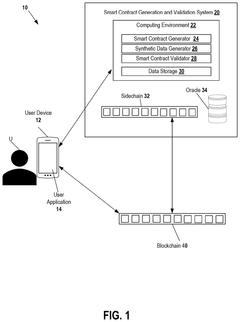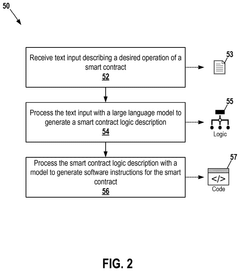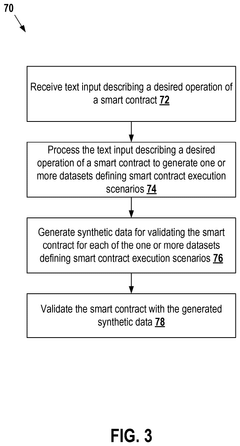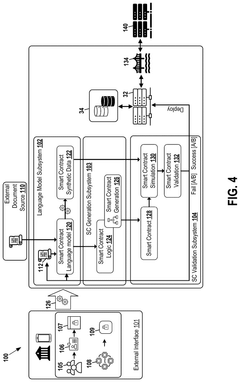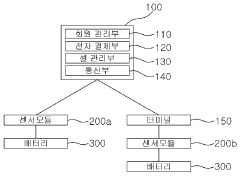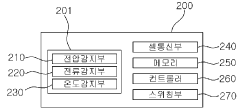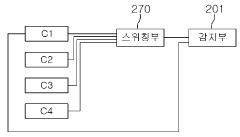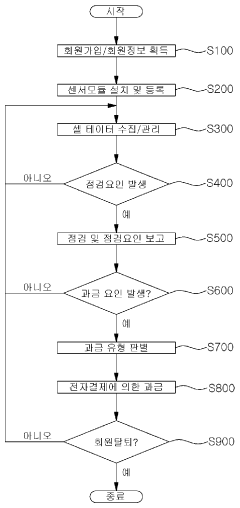Influence of Smart Contracts on Battery Management Systems Operations
AUG 8, 20259 MIN READ
Generate Your Research Report Instantly with AI Agent
Patsnap Eureka helps you evaluate technical feasibility & market potential.
Smart Contract BMS Background and Objectives
Smart contracts have emerged as a transformative technology in various industries, and their potential impact on Battery Management Systems (BMS) operations is becoming increasingly significant. The integration of smart contracts with BMS represents a convergence of blockchain technology and energy management, aiming to enhance the efficiency, transparency, and reliability of battery systems.
The evolution of BMS has been driven by the growing demand for energy storage solutions, particularly in the context of renewable energy integration and electric vehicle adoption. Traditional BMS have focused on monitoring and controlling battery parameters such as voltage, temperature, and state of charge. However, these systems often lack the ability to autonomously execute complex operations or facilitate seamless interactions between multiple stakeholders in the energy ecosystem.
Smart contracts, as self-executing contracts with the terms of the agreement directly written into code, offer a promising solution to address these limitations. By leveraging blockchain technology, smart contracts can enable automated, secure, and transparent transactions and operations within BMS. This integration has the potential to revolutionize how battery systems are managed, maintained, and optimized across various applications.
The primary objectives of incorporating smart contracts into BMS operations are multifaceted. Firstly, it aims to enhance the overall efficiency of battery management by automating processes such as charging schedules, energy trading, and maintenance protocols. This automation can lead to optimized battery performance and extended lifespan. Secondly, smart contracts can improve the transparency and traceability of battery-related transactions, providing a tamper-proof record of all operations and interactions within the system.
Another key objective is to facilitate more dynamic and flexible energy management strategies. Smart contracts can enable real-time adjustments to battery operations based on various factors such as energy demand, pricing, and grid conditions. This adaptability is particularly crucial in the context of smart grids and decentralized energy systems, where batteries play a vital role in balancing supply and demand.
Furthermore, the integration of smart contracts with BMS seeks to enhance security and reduce the risk of fraud or unauthorized access. By utilizing blockchain's inherent security features, smart contracts can provide a robust framework for managing access rights, verifying identities, and ensuring the integrity of data and transactions related to battery operations.
As the technology landscape continues to evolve, the convergence of smart contracts and BMS is expected to drive innovation in energy storage solutions, paving the way for more efficient, sustainable, and interconnected energy systems. This technological synergy aligns with broader trends in digitalization and decentralization of energy infrastructure, positioning smart contract-enabled BMS as a key enabler of future energy ecosystems.
The evolution of BMS has been driven by the growing demand for energy storage solutions, particularly in the context of renewable energy integration and electric vehicle adoption. Traditional BMS have focused on monitoring and controlling battery parameters such as voltage, temperature, and state of charge. However, these systems often lack the ability to autonomously execute complex operations or facilitate seamless interactions between multiple stakeholders in the energy ecosystem.
Smart contracts, as self-executing contracts with the terms of the agreement directly written into code, offer a promising solution to address these limitations. By leveraging blockchain technology, smart contracts can enable automated, secure, and transparent transactions and operations within BMS. This integration has the potential to revolutionize how battery systems are managed, maintained, and optimized across various applications.
The primary objectives of incorporating smart contracts into BMS operations are multifaceted. Firstly, it aims to enhance the overall efficiency of battery management by automating processes such as charging schedules, energy trading, and maintenance protocols. This automation can lead to optimized battery performance and extended lifespan. Secondly, smart contracts can improve the transparency and traceability of battery-related transactions, providing a tamper-proof record of all operations and interactions within the system.
Another key objective is to facilitate more dynamic and flexible energy management strategies. Smart contracts can enable real-time adjustments to battery operations based on various factors such as energy demand, pricing, and grid conditions. This adaptability is particularly crucial in the context of smart grids and decentralized energy systems, where batteries play a vital role in balancing supply and demand.
Furthermore, the integration of smart contracts with BMS seeks to enhance security and reduce the risk of fraud or unauthorized access. By utilizing blockchain's inherent security features, smart contracts can provide a robust framework for managing access rights, verifying identities, and ensuring the integrity of data and transactions related to battery operations.
As the technology landscape continues to evolve, the convergence of smart contracts and BMS is expected to drive innovation in energy storage solutions, paving the way for more efficient, sustainable, and interconnected energy systems. This technological synergy aligns with broader trends in digitalization and decentralization of energy infrastructure, positioning smart contract-enabled BMS as a key enabler of future energy ecosystems.
Market Demand Analysis for Smart Contract BMS
The market demand for smart contract-enabled Battery Management Systems (BMS) is experiencing significant growth, driven by the increasing adoption of electric vehicles (EVs) and renewable energy storage solutions. As the automotive and energy sectors continue to evolve, there is a growing need for more efficient, transparent, and secure battery management systems.
Smart contracts, when integrated with BMS, offer numerous advantages that address current market pain points. These include enhanced transparency in battery lifecycle management, improved data integrity, and automated processes for warranty claims and maintenance schedules. The ability of smart contracts to execute predefined actions based on real-time battery data is particularly attractive to fleet operators and energy storage providers seeking to optimize their assets' performance and longevity.
The EV market, a primary driver for smart contract BMS demand, is projected to grow substantially in the coming years. This growth is fueled by government initiatives promoting clean energy, consumer awareness of environmental issues, and advancements in battery technology. As EV adoption increases, so does the need for sophisticated BMS solutions that can manage complex battery ecosystems efficiently.
In the renewable energy sector, the demand for smart contract BMS is also on the rise. Grid operators and energy companies are increasingly investing in large-scale battery storage systems to balance supply and demand. Smart contracts can play a crucial role in managing these systems, automating energy trading, and ensuring optimal utilization of stored energy.
The industrial and commercial sectors represent another significant market for smart contract BMS. Companies with large fleets of electric vehicles or stationary battery installations are looking for ways to streamline their operations and reduce costs. Smart contract BMS offers the potential for automated billing, predictive maintenance, and more efficient energy management across distributed battery networks.
However, the market demand is not without challenges. Concerns about data security, interoperability between different systems, and the need for standardization in smart contract protocols are factors that could potentially slow adoption. Additionally, the regulatory landscape surrounding smart contracts and their application in critical systems like BMS is still evolving, which may impact market growth in some regions.
Despite these challenges, the overall market trajectory for smart contract BMS remains positive. The technology's potential to reduce operational costs, improve battery performance, and enable new business models in the energy and transportation sectors continues to drive demand. As the technology matures and more use cases are demonstrated, it is expected that the market for smart contract BMS will expand further, creating opportunities for both established players and innovative startups in the battery management ecosystem.
Smart contracts, when integrated with BMS, offer numerous advantages that address current market pain points. These include enhanced transparency in battery lifecycle management, improved data integrity, and automated processes for warranty claims and maintenance schedules. The ability of smart contracts to execute predefined actions based on real-time battery data is particularly attractive to fleet operators and energy storage providers seeking to optimize their assets' performance and longevity.
The EV market, a primary driver for smart contract BMS demand, is projected to grow substantially in the coming years. This growth is fueled by government initiatives promoting clean energy, consumer awareness of environmental issues, and advancements in battery technology. As EV adoption increases, so does the need for sophisticated BMS solutions that can manage complex battery ecosystems efficiently.
In the renewable energy sector, the demand for smart contract BMS is also on the rise. Grid operators and energy companies are increasingly investing in large-scale battery storage systems to balance supply and demand. Smart contracts can play a crucial role in managing these systems, automating energy trading, and ensuring optimal utilization of stored energy.
The industrial and commercial sectors represent another significant market for smart contract BMS. Companies with large fleets of electric vehicles or stationary battery installations are looking for ways to streamline their operations and reduce costs. Smart contract BMS offers the potential for automated billing, predictive maintenance, and more efficient energy management across distributed battery networks.
However, the market demand is not without challenges. Concerns about data security, interoperability between different systems, and the need for standardization in smart contract protocols are factors that could potentially slow adoption. Additionally, the regulatory landscape surrounding smart contracts and their application in critical systems like BMS is still evolving, which may impact market growth in some regions.
Despite these challenges, the overall market trajectory for smart contract BMS remains positive. The technology's potential to reduce operational costs, improve battery performance, and enable new business models in the energy and transportation sectors continues to drive demand. As the technology matures and more use cases are demonstrated, it is expected that the market for smart contract BMS will expand further, creating opportunities for both established players and innovative startups in the battery management ecosystem.
Current State and Challenges in BMS Smart Contracts
The integration of smart contracts into Battery Management Systems (BMS) represents a significant advancement in the field of energy storage and management. However, the current state of this technology is characterized by both promising developments and notable challenges.
Smart contracts, powered by blockchain technology, are increasingly being applied to BMS operations, offering enhanced transparency, security, and automation. These self-executing contracts can facilitate more efficient energy trading, optimize battery usage, and improve overall system reliability. Several pilot projects and research initiatives have demonstrated the potential of smart contracts in BMS, particularly in areas such as peer-to-peer energy trading and grid balancing.
Despite these advancements, the widespread adoption of smart contracts in BMS faces several hurdles. One of the primary challenges is the lack of standardization across different blockchain platforms and BMS implementations. This fragmentation makes it difficult to ensure interoperability between various systems and hinders the scalability of smart contract solutions in the BMS domain.
Security concerns also pose a significant challenge. While blockchain technology offers inherent security benefits, the integration of smart contracts with physical BMS hardware introduces new vulnerabilities. Ensuring the integrity of data inputs from BMS sensors and protecting against potential cyber-attacks on the smart contract infrastructure remain critical issues that need to be addressed.
Another challenge lies in the regulatory landscape. The use of smart contracts in energy systems often operates in a legal grey area, with many jurisdictions lacking clear guidelines on their implementation and enforcement. This regulatory uncertainty can deter potential adopters and slow down innovation in the field.
The complexity of BMS operations also presents a challenge for smart contract implementation. Battery systems involve intricate processes and numerous variables, making it difficult to capture all possible scenarios within smart contract logic. This complexity can lead to potential errors or unforeseen circumstances that may not be adequately addressed by current smart contract designs.
Furthermore, the energy sector's conservative nature and the high stakes involved in battery management systems contribute to a cautious approach towards adopting new technologies like smart contracts. Many stakeholders are hesitant to fully embrace these solutions without extensive testing and validation, which slows down the overall adoption rate.
Lastly, there is a notable skills gap in the industry. The intersection of blockchain technology, smart contracts, and battery management systems requires a unique set of expertise that is currently in short supply. This shortage of skilled professionals capable of developing, implementing, and maintaining smart contract solutions for BMS further impedes progress in this field.
Smart contracts, powered by blockchain technology, are increasingly being applied to BMS operations, offering enhanced transparency, security, and automation. These self-executing contracts can facilitate more efficient energy trading, optimize battery usage, and improve overall system reliability. Several pilot projects and research initiatives have demonstrated the potential of smart contracts in BMS, particularly in areas such as peer-to-peer energy trading and grid balancing.
Despite these advancements, the widespread adoption of smart contracts in BMS faces several hurdles. One of the primary challenges is the lack of standardization across different blockchain platforms and BMS implementations. This fragmentation makes it difficult to ensure interoperability between various systems and hinders the scalability of smart contract solutions in the BMS domain.
Security concerns also pose a significant challenge. While blockchain technology offers inherent security benefits, the integration of smart contracts with physical BMS hardware introduces new vulnerabilities. Ensuring the integrity of data inputs from BMS sensors and protecting against potential cyber-attacks on the smart contract infrastructure remain critical issues that need to be addressed.
Another challenge lies in the regulatory landscape. The use of smart contracts in energy systems often operates in a legal grey area, with many jurisdictions lacking clear guidelines on their implementation and enforcement. This regulatory uncertainty can deter potential adopters and slow down innovation in the field.
The complexity of BMS operations also presents a challenge for smart contract implementation. Battery systems involve intricate processes and numerous variables, making it difficult to capture all possible scenarios within smart contract logic. This complexity can lead to potential errors or unforeseen circumstances that may not be adequately addressed by current smart contract designs.
Furthermore, the energy sector's conservative nature and the high stakes involved in battery management systems contribute to a cautious approach towards adopting new technologies like smart contracts. Many stakeholders are hesitant to fully embrace these solutions without extensive testing and validation, which slows down the overall adoption rate.
Lastly, there is a notable skills gap in the industry. The intersection of blockchain technology, smart contracts, and battery management systems requires a unique set of expertise that is currently in short supply. This shortage of skilled professionals capable of developing, implementing, and maintaining smart contract solutions for BMS further impedes progress in this field.
Existing Smart Contract Solutions for BMS
01 Execution and management of smart contracts
This category focuses on the operational aspects of smart contracts, including their execution, management, and monitoring. It covers techniques for deploying, updating, and terminating smart contracts on blockchain networks. The methods also include ways to handle contract interactions, manage state changes, and ensure proper execution of contract terms.- Execution and management of smart contracts: This category focuses on the operational aspects of smart contracts, including their execution, management, and monitoring. It covers techniques for deploying, updating, and terminating smart contracts on blockchain networks. The methods also include ways to handle complex contract interactions, manage contract states, and ensure proper execution of contract terms.
- Security and validation of smart contracts: This area addresses the security concerns and validation processes for smart contracts. It includes methods for detecting vulnerabilities, preventing attacks, and ensuring the integrity of contract code. Techniques for formal verification, auditing, and testing of smart contracts are also covered to enhance their reliability and trustworthiness.
- Integration of smart contracts with external systems: This category explores the integration of smart contracts with external systems and data sources. It includes methods for connecting smart contracts to off-chain resources, implementing oracles for real-world data input, and facilitating interoperability between different blockchain networks. The techniques aim to expand the functionality and applicability of smart contracts in various domains.
- Optimization and scalability of smart contract operations: This area focuses on improving the performance and scalability of smart contract operations. It includes techniques for optimizing contract execution, reducing gas costs, and enhancing transaction throughput. Methods for implementing sharding, layer-2 solutions, and other scalability approaches for smart contracts are also covered.
- Governance and upgradability of smart contracts: This category addresses the governance and upgradability aspects of smart contracts. It includes methods for implementing upgradeable contract patterns, managing contract versions, and facilitating decentralized governance mechanisms. Techniques for handling contract migrations, implementing proxy patterns, and managing contract parameters through governance processes are also covered.
02 Smart contract security and validation
This area addresses the security concerns and validation processes for smart contracts. It includes methods for auditing smart contract code, detecting vulnerabilities, and implementing security measures to prevent attacks or exploits. The techniques also cover ways to verify the correctness and integrity of smart contracts before and during their deployment on blockchain networks.Expand Specific Solutions03 Integration of smart contracts with external systems
This category explores the integration of smart contracts with external systems and data sources. It includes methods for connecting smart contracts to off-chain resources, implementing oracles for real-world data input, and facilitating interoperability between different blockchain networks. The techniques aim to enhance the functionality and applicability of smart contracts in various industries and use cases.Expand Specific Solutions04 Optimization and scalability of smart contract operations
This area focuses on improving the performance and scalability of smart contract operations. It includes techniques for optimizing gas consumption, reducing transaction costs, and enhancing the overall efficiency of smart contract execution. The methods also cover approaches to handle high-volume transactions and improve the throughput of smart contract-based systems.Expand Specific Solutions05 Governance and upgradability of smart contracts
This category addresses the governance and upgradability aspects of smart contracts. It includes methods for implementing upgradable smart contract architectures, managing contract versions, and handling contract migrations. The techniques also cover governance mechanisms for decision-making in decentralized autonomous organizations (DAOs) and other blockchain-based systems that rely on smart contracts.Expand Specific Solutions
Key Players in Smart Contract BMS Industry
The smart contract integration with Battery Management Systems (BMS) is in an early development stage, with a growing market potential as the electric vehicle and energy storage sectors expand. The technology's maturity is still evolving, with major players like LG Energy Solution, Panasonic, and 3M Innovative Properties leading research efforts. Companies such as ZTE Corp. and Honda Motor Co. are also exploring applications in their respective fields. The Naval Research Laboratory and universities like Rutgers are contributing to advancements in this area, indicating a collaborative approach between industry, government, and academia to develop this technology further.
LG Energy Solution Ltd.
Technical Solution: LG Energy Solution has developed a smart contract-based Battery Management System (BMS) that leverages blockchain technology to enhance the efficiency and security of battery operations. Their system utilizes smart contracts to automate and optimize various aspects of battery management, including state of charge monitoring, thermal management, and predictive maintenance[1]. The smart contracts are programmed to execute predefined actions based on real-time battery data, ensuring optimal performance and longevity. Additionally, LG's solution incorporates a distributed ledger to securely store and share battery health and usage data among stakeholders, enabling transparent and tamper-proof record-keeping[3].
Strengths: Enhanced security and transparency through blockchain integration, automated optimization of battery performance. Weaknesses: Potential scalability issues with blockchain technology, increased computational requirements for BMS.
Panasonic Intellectual Property Corporation of America
Technical Solution: Panasonic has implemented a smart contract-driven Battery Management System that focuses on improving the reliability and efficiency of large-scale energy storage systems. Their approach utilizes Ethereum-based smart contracts to manage the charging and discharging cycles of battery arrays, optimizing energy distribution and prolonging battery life[2]. The system employs machine learning algorithms to analyze historical data and predict future energy demands, allowing for proactive adjustments to battery usage patterns. Panasonic's solution also incorporates a decentralized identity management system for secure access control and data sharing among multiple stakeholders in the energy ecosystem[4].
Strengths: Advanced predictive capabilities through machine learning integration, improved energy distribution efficiency. Weaknesses: Dependence on Ethereum network stability, potential for high transaction costs during peak network usage.
Core Innovations in BMS Smart Contracts
Layer 2 transaction monitoring
PatentPendingUS20240333741A1
Innovation
- A system comprising a layer 1 blockchain, a layer 2 solution communicatively coupled via a bridge, an oracle, and a monitoring system with AI capabilities to analyze network activity data, determine corrective actions, and alter operating parameters to enhance security and efficiency.
Battery management system and a service providing method using the same
PatentWO2011108862A2
Innovation
- A battery management system that includes a sensor module to detect voltage, current, and temperature, creating cell data for analysis, and a management system for remote monitoring and maintenance, along with user membership management and electronic payment services for billing, enabling efficient battery management and stable device operation.
Regulatory Framework for BMS Smart Contracts
The regulatory framework for Battery Management System (BMS) smart contracts is evolving rapidly as the intersection of blockchain technology and energy management systems gains prominence. As smart contracts become increasingly integrated into BMS operations, regulatory bodies are working to establish guidelines that ensure safety, security, and fairness in these automated systems.
One of the primary regulatory concerns is the standardization of smart contract protocols for BMS applications. Regulatory agencies are collaborating with industry stakeholders to develop common standards that will facilitate interoperability and ensure consistent performance across different BMS platforms. These standards aim to address issues such as data format, communication protocols, and security requirements for smart contracts in battery management.
Data privacy and protection regulations play a crucial role in the BMS smart contract landscape. As these systems often handle sensitive information related to energy consumption and battery performance, regulators are implementing strict guidelines for data handling, storage, and transmission. Compliance with regulations such as the General Data Protection Regulation (GDPR) in the European Union and similar laws in other jurisdictions is becoming a key consideration for BMS smart contract developers.
The regulatory framework also focuses on ensuring the transparency and auditability of BMS smart contracts. Regulators are mandating that smart contract code be open-source and subject to third-party audits to prevent manipulation and ensure fair operation. This approach aims to build trust in the system and protect consumers from potential abuses or errors in the automated decision-making processes of BMS smart contracts.
Energy market regulations are being adapted to accommodate the integration of BMS smart contracts. Regulatory bodies are working on frameworks that allow for the seamless participation of battery systems in energy markets through smart contracts. This includes establishing rules for automated bidding, settlement processes, and grid balancing services provided by battery systems controlled by smart contracts.
Cybersecurity regulations are another critical aspect of the BMS smart contract regulatory framework. As these systems become more interconnected and reliant on digital infrastructure, regulators are imposing stringent security requirements to protect against cyber threats. This includes mandating regular security audits, implementing robust encryption standards, and establishing incident response protocols for BMS smart contract systems.
Liability and accountability in automated BMS operations are also being addressed by regulators. Clear guidelines are being developed to determine responsibility in cases of system failures, errors in smart contract execution, or unintended consequences of automated decisions. This includes defining the legal status of smart contracts and establishing mechanisms for dispute resolution in BMS-related transactions.
One of the primary regulatory concerns is the standardization of smart contract protocols for BMS applications. Regulatory agencies are collaborating with industry stakeholders to develop common standards that will facilitate interoperability and ensure consistent performance across different BMS platforms. These standards aim to address issues such as data format, communication protocols, and security requirements for smart contracts in battery management.
Data privacy and protection regulations play a crucial role in the BMS smart contract landscape. As these systems often handle sensitive information related to energy consumption and battery performance, regulators are implementing strict guidelines for data handling, storage, and transmission. Compliance with regulations such as the General Data Protection Regulation (GDPR) in the European Union and similar laws in other jurisdictions is becoming a key consideration for BMS smart contract developers.
The regulatory framework also focuses on ensuring the transparency and auditability of BMS smart contracts. Regulators are mandating that smart contract code be open-source and subject to third-party audits to prevent manipulation and ensure fair operation. This approach aims to build trust in the system and protect consumers from potential abuses or errors in the automated decision-making processes of BMS smart contracts.
Energy market regulations are being adapted to accommodate the integration of BMS smart contracts. Regulatory bodies are working on frameworks that allow for the seamless participation of battery systems in energy markets through smart contracts. This includes establishing rules for automated bidding, settlement processes, and grid balancing services provided by battery systems controlled by smart contracts.
Cybersecurity regulations are another critical aspect of the BMS smart contract regulatory framework. As these systems become more interconnected and reliant on digital infrastructure, regulators are imposing stringent security requirements to protect against cyber threats. This includes mandating regular security audits, implementing robust encryption standards, and establishing incident response protocols for BMS smart contract systems.
Liability and accountability in automated BMS operations are also being addressed by regulators. Clear guidelines are being developed to determine responsibility in cases of system failures, errors in smart contract execution, or unintended consequences of automated decisions. This includes defining the legal status of smart contracts and establishing mechanisms for dispute resolution in BMS-related transactions.
Energy Efficiency Impact of Smart Contract BMS
The integration of smart contracts into Battery Management Systems (BMS) has the potential to significantly enhance energy efficiency in various applications. By leveraging blockchain technology and automated execution of predefined conditions, smart contract-enabled BMS can optimize battery usage, reduce energy waste, and extend battery life.
One of the primary ways smart contracts improve energy efficiency is through dynamic load balancing. These contracts can automatically adjust power distribution based on real-time demand and supply data, ensuring that energy is allocated efficiently across connected devices or grid systems. This intelligent distribution minimizes energy losses and reduces the strain on individual battery cells, ultimately leading to improved overall system performance.
Smart contracts also enable more precise and adaptive charging strategies. By continuously monitoring battery health, usage patterns, and environmental factors, these contracts can implement optimized charging cycles that maximize energy efficiency while minimizing degradation. For example, they can automatically initiate charging during off-peak hours when electricity rates are lower, or adjust charging speeds based on the battery's current state and projected demand.
Furthermore, smart contract BMS can facilitate seamless integration with renewable energy sources. By coordinating battery charging and discharging with the availability of renewable energy, these systems can maximize the utilization of clean energy and reduce reliance on less efficient conventional power sources. This integration not only improves overall energy efficiency but also contributes to a more sustainable energy ecosystem.
The implementation of smart contracts in BMS also enables advanced predictive maintenance capabilities. By analyzing historical data and real-time performance metrics, these systems can anticipate potential issues and schedule maintenance activities proactively. This approach helps prevent energy-wasting malfunctions and extends the operational lifespan of battery systems, thereby improving long-term energy efficiency.
Moreover, smart contract BMS can optimize energy trading and sharing in microgrid environments. By automating peer-to-peer energy transactions based on predefined rules and current market conditions, these systems can create more efficient energy marketplaces. This capability not only improves overall grid stability but also incentivizes energy conservation and efficient usage among participants.
In conclusion, the integration of smart contracts into Battery Management Systems offers substantial potential for improving energy efficiency across various applications. From optimizing power distribution and charging strategies to facilitating renewable energy integration and predictive maintenance, smart contract BMS represents a significant step forward in maximizing the performance and sustainability of battery-powered systems.
One of the primary ways smart contracts improve energy efficiency is through dynamic load balancing. These contracts can automatically adjust power distribution based on real-time demand and supply data, ensuring that energy is allocated efficiently across connected devices or grid systems. This intelligent distribution minimizes energy losses and reduces the strain on individual battery cells, ultimately leading to improved overall system performance.
Smart contracts also enable more precise and adaptive charging strategies. By continuously monitoring battery health, usage patterns, and environmental factors, these contracts can implement optimized charging cycles that maximize energy efficiency while minimizing degradation. For example, they can automatically initiate charging during off-peak hours when electricity rates are lower, or adjust charging speeds based on the battery's current state and projected demand.
Furthermore, smart contract BMS can facilitate seamless integration with renewable energy sources. By coordinating battery charging and discharging with the availability of renewable energy, these systems can maximize the utilization of clean energy and reduce reliance on less efficient conventional power sources. This integration not only improves overall energy efficiency but also contributes to a more sustainable energy ecosystem.
The implementation of smart contracts in BMS also enables advanced predictive maintenance capabilities. By analyzing historical data and real-time performance metrics, these systems can anticipate potential issues and schedule maintenance activities proactively. This approach helps prevent energy-wasting malfunctions and extends the operational lifespan of battery systems, thereby improving long-term energy efficiency.
Moreover, smart contract BMS can optimize energy trading and sharing in microgrid environments. By automating peer-to-peer energy transactions based on predefined rules and current market conditions, these systems can create more efficient energy marketplaces. This capability not only improves overall grid stability but also incentivizes energy conservation and efficient usage among participants.
In conclusion, the integration of smart contracts into Battery Management Systems offers substantial potential for improving energy efficiency across various applications. From optimizing power distribution and charging strategies to facilitating renewable energy integration and predictive maintenance, smart contract BMS represents a significant step forward in maximizing the performance and sustainability of battery-powered systems.
Unlock deeper insights with Patsnap Eureka Quick Research — get a full tech report to explore trends and direct your research. Try now!
Generate Your Research Report Instantly with AI Agent
Supercharge your innovation with Patsnap Eureka AI Agent Platform!
